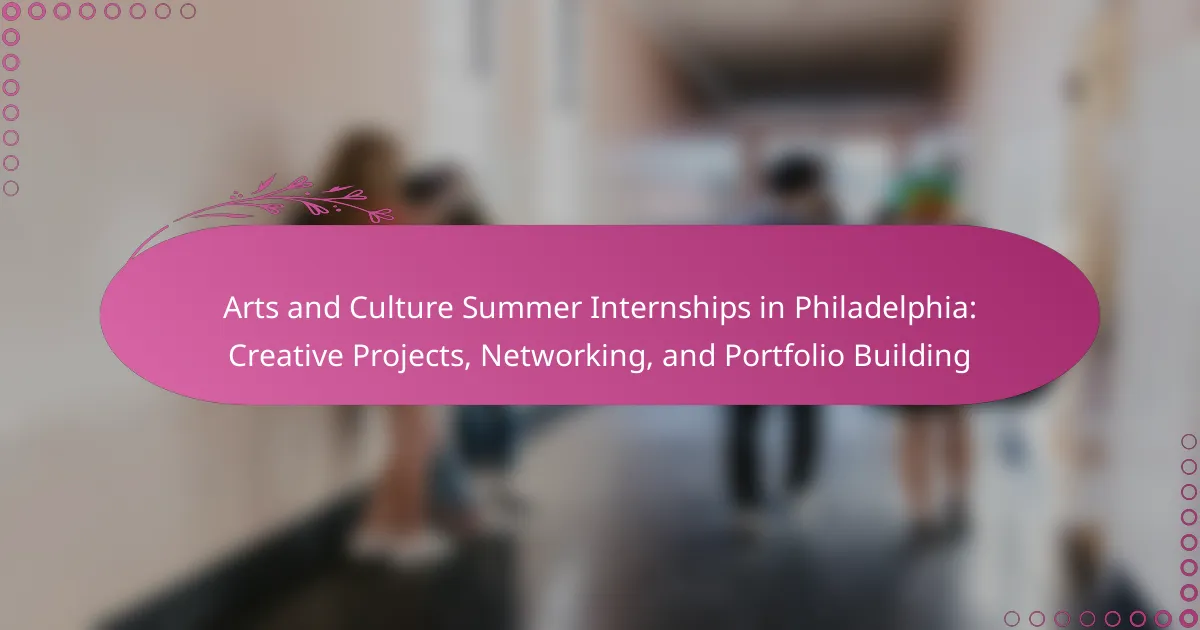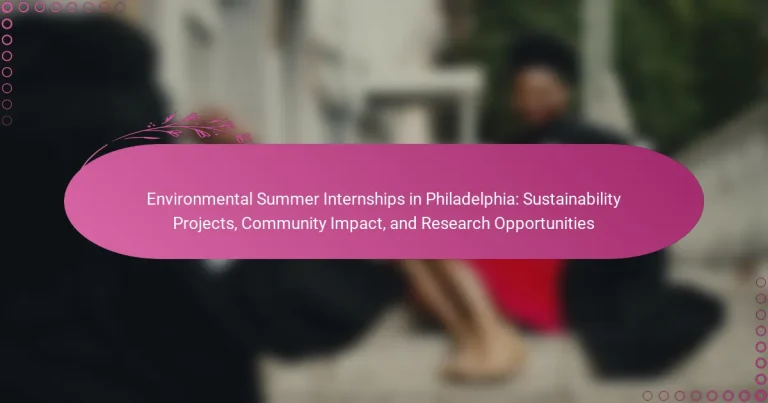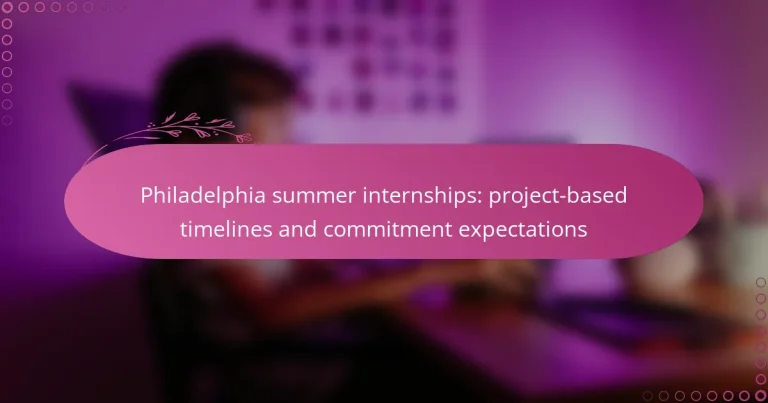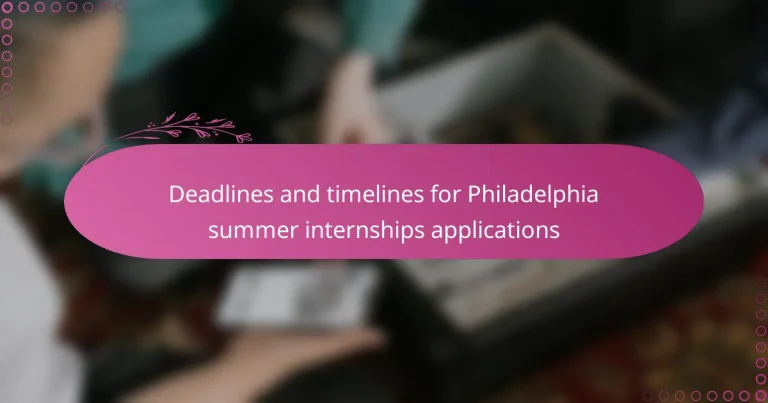

What are Arts and Culture Summer Internships in Philadelphia?
Arts and Culture Summer Internships in Philadelphia provide students and emerging professionals opportunities to gain hands-on experience in the arts sector. These internships typically involve working with cultural organizations, museums, or galleries. Interns may assist in various roles, including event planning, marketing, or educational programming. Many internships are designed to enhance skills and build professional networks. Participants often work on creative projects that contribute to their portfolios. According to a report by the Greater Philadelphia Cultural Alliance, internships in this field are vital for career development. They help individuals understand the inner workings of arts organizations while fostering community engagement.
How do these internships contribute to career development?
Internships contribute to career development by providing hands-on experience in the arts and culture sector. They allow individuals to apply theoretical knowledge in practical settings. Interns build essential skills through real-world projects. Networking opportunities arise from interactions with industry professionals. These connections can lead to job offers or recommendations. Internships enhance resumes by showcasing relevant experience. They also help interns identify their career interests and goals. According to a survey by the National Association of Colleges and Employers, 70% of interns receive job offers from their internship employers.
What skills can interns expect to gain from these experiences?
Interns can expect to gain valuable skills such as project management, communication, and teamwork. Project management skills help interns learn how to plan, execute, and evaluate creative projects effectively. Strong communication skills are developed through collaboration with diverse teams and stakeholders. Teamwork skills are honed by working alongside other interns and professionals in a collaborative environment. Additionally, interns often enhance their problem-solving abilities by navigating challenges in real-world projects. Networking skills are cultivated by connecting with industry professionals, which can lead to future opportunities. Portfolio building is another key skill, as interns create tangible work samples to showcase their abilities. Overall, these experiences provide a comprehensive skill set that prepares interns for future careers in the arts and culture sector.
How do internships in arts and culture differ from other fields?
Internships in arts and culture differ from other fields primarily in their focus on creativity and cultural engagement. These internships often emphasize hands-on experience in artistic environments, such as galleries, theaters, or museums. Unlike corporate internships, they may prioritize artistic skills and cultural knowledge over conventional business acumen.
Interns in this sector typically work on creative projects that contribute to artistic productions or cultural events. Networking opportunities are often more informal and community-based, fostering connections with artists and cultural leaders. Additionally, portfolio building is a crucial aspect, as interns may showcase their creative work directly to the public.
In contrast, internships in other fields often emphasize structured learning and professional development within corporate settings. They tend to focus on specific job skills and formal training. Arts and culture internships provide a unique blend of artistic expression and community involvement, setting them apart from more traditional internship experiences.
Why is Philadelphia a prime location for these internships?
Philadelphia is a prime location for arts and culture internships due to its rich historical and cultural heritage. The city hosts numerous museums, galleries, and theaters, providing diverse opportunities for hands-on experience. Institutions like the Philadelphia Museum of Art and the Barnes Foundation attract interns looking to enhance their skills. Philadelphia’s vibrant arts scene fosters creativity and collaboration among interns and professionals. The city also offers a strong network of arts organizations, making it easier for interns to connect with industry leaders. Additionally, Philadelphia’s affordability compared to other major cities allows interns to live and work without excessive financial strain. The city’s commitment to the arts is evident in its various festivals and events, which further enrich the internship experience.
What cultural institutions are involved in offering internships?
Cultural institutions involved in offering internships include museums, galleries, theaters, and cultural organizations. Notable examples are the Philadelphia Museum of Art, the Barnes Foundation, and the Pennsylvania Academy of the Fine Arts. These institutions provide hands-on experience in various artistic and administrative roles. Internships often focus on education, curation, and community outreach. Many offer networking opportunities with professionals in the arts. Additionally, local arts organizations frequently collaborate with schools and universities to facilitate internships. This engagement supports the development of future artists and cultural leaders.
How does Philadelphia’s arts scene enhance internship opportunities?
Philadelphia’s arts scene enhances internship opportunities by providing diverse platforms for creative engagement. The city hosts numerous galleries, theaters, and cultural institutions. These venues frequently seek interns for various roles, from administration to curation. Interns gain hands-on experience in a vibrant artistic environment. Networking events and exhibitions allow interns to connect with industry professionals. This exposure can lead to job offers and future collaborations. Additionally, the city’s rich cultural heritage attracts a wide range of artistic projects. This variety ensures that interns can find opportunities aligning with their interests and career goals.

What types of creative projects can interns expect to work on?
Interns can expect to work on various creative projects, including graphic design, video production, and content creation. These projects often involve collaborating with teams to develop marketing materials. Interns may also engage in social media campaigns to enhance brand visibility. Event planning and execution are common tasks, allowing interns to gain hands-on experience. Additionally, some projects may focus on research and development of artistic concepts. Interns can expect to contribute to exhibitions or performances, fostering their creative skills. These experiences help interns build portfolios that showcase their work in the arts and culture sector.
How do these projects vary across different organizations?
Projects vary across different organizations based on their focus and objectives. Some organizations prioritize community engagement, while others emphasize artistic development. For instance, a nonprofit may focus on social impact through art, whereas a gallery might concentrate on showcasing emerging artists. Additionally, the resources available can influence project scale and complexity. Organizations with larger budgets can undertake more extensive projects compared to smaller entities. Furthermore, the target audience also shapes project design. Projects aimed at youth may incorporate educational elements, while those for adults might focus on professional networking. Overall, these variations reflect the distinct missions and capabilities of each organization involved in arts and culture internships.
What are some examples of past projects completed by interns?
Interns have completed various projects in the arts and culture sector. One example is organizing community art exhibitions. Interns have also developed marketing campaigns for local artists. Another project involved creating digital content for social media platforms. Additionally, some interns contributed to research on local art history. They assisted in curating collections for galleries. Interns have also participated in workshops to enhance their skills. These projects provide hands-on experience and portfolio development.
How do interns contribute to the success of these projects?
Interns contribute to the success of projects by providing fresh perspectives and innovative ideas. Their involvement often leads to increased creativity in project development. Interns can take on various tasks, allowing full-time staff to focus on higher-level responsibilities. They assist with research, which can enhance the quality of project outcomes. Interns also help with logistical support, ensuring that projects run smoothly and efficiently. Their participation fosters collaboration and team dynamics, often leading to improved project results. Additionally, interns can engage with community members, broadening the project’s reach and impact. Their contributions can lead to enhanced networking opportunities for both themselves and the organization.
What role does networking play in these internships?
Networking plays a crucial role in arts and culture summer internships in Philadelphia. It facilitates connections with industry professionals and peers. These relationships can lead to mentorship opportunities. Networking also enhances the visibility of interns within their chosen field. Interns can gain insights into industry trends and best practices through networking. Additionally, it may open doors to future job opportunities. A study by the National Association of Colleges and Employers found that 70% of jobs are obtained through networking. Therefore, building a robust network during internships is essential for career advancement.
How can interns effectively build professional connections?
Interns can effectively build professional connections by actively engaging with colleagues and industry professionals. Attending networking events is crucial, as these gatherings provide opportunities to meet influential figures. Interns should also seek informational interviews to gain insights and establish rapport with professionals. Utilizing social media platforms like LinkedIn can enhance visibility and facilitate connections. Joining relevant organizations or clubs can further expand an intern’s network. Participating in group projects fosters teamwork and allows interns to showcase their skills. Following up with contacts after initial meetings reinforces relationships. According to a survey by the National Association of Colleges and Employers, 85% of jobs are filled through networking, highlighting its importance for interns.
What networking opportunities are available within the internship program?
The internship program offers various networking opportunities. Interns can connect with industry professionals through organized events. These events include workshops, panels, and networking mixers. Interns also have access to mentorship from experienced professionals in the arts and culture sector. Additionally, collaborating on projects with peers fosters valuable connections. Participation in community outreach initiatives further expands networking possibilities. Engaging with local organizations and artists enhances interns’ professional networks. These opportunities are designed to build relationships that can benefit future career paths.

How can interns build their portfolios during their experience?
Interns can build their portfolios during their experience by actively engaging in projects and documenting their work. They should seek opportunities to contribute to creative projects that align with their interests. This involvement allows interns to showcase their skills and creativity.
Interns can also request feedback from supervisors and peers to improve their work. Collecting testimonials and references enhances the credibility of their portfolio. Additionally, they should maintain a record of their tasks and accomplishments throughout the internship.
Creating a digital portfolio or website can effectively present their work to potential employers. Interns should include a variety of projects to demonstrate versatility. Participating in networking events can also lead to valuable connections and recommendations.
What types of work should interns include in their portfolios?
Interns should include a variety of work in their portfolios. They should showcase projects that highlight their skills and creativity. Examples include design work, written articles, and research projects. Interns can also include presentations and event planning contributions. Visual documentation of events they participated in adds value. Testimonials or references from supervisors enhance credibility. Additionally, including collaborative projects demonstrates teamwork abilities. A well-rounded portfolio reflects diverse experiences and competencies.
How can interns showcase their creative projects effectively?
Interns can showcase their creative projects effectively by utilizing digital platforms. Creating an online portfolio is essential. This allows easy access for potential employers. Social media can also be leveraged to share projects. Platforms like Instagram and LinkedIn are particularly useful. Engaging storytelling enhances the presentation of projects. Clear visuals and descriptions attract attention. Networking events provide opportunities to present work in person. Feedback from peers and mentors can improve the presentation quality.
What are best practices for presenting a portfolio to potential employers?
To present a portfolio to potential employers effectively, focus on clarity and relevance. Begin with a clean and organized layout. Use high-quality images and clear descriptions for each project. Tailor your portfolio to the specific job or industry. Highlight your best work first to make a strong impression. Include a brief introduction about yourself and your creative vision. Ensure that your contact information is easy to find. Finally, practice presenting your portfolio verbally to articulate your thought process and the skills demonstrated in your work. These practices enhance engagement and showcase professionalism.
What tips can help interns maximize their internship experience?
Interns can maximize their internship experience by actively seeking learning opportunities. Engaging with mentors provides guidance and insights. Setting specific goals helps interns stay focused and measure progress. Networking with colleagues fosters professional relationships and opens doors for future opportunities. Taking initiative on projects demonstrates enthusiasm and commitment. Seeking feedback allows for personal and professional growth. Documenting experiences builds a portfolio showcasing skills and accomplishments. Lastly, maintaining a positive attitude enhances the overall internship experience.
How should interns approach goal setting for their internships?
Interns should approach goal setting by identifying specific, measurable objectives. First, they need to understand the skills they want to develop. This could include technical skills related to their field or soft skills like communication. Next, interns should align their goals with the organization’s mission and projects. This ensures relevance and adds value to their experience.
Setting short-term and long-term goals is crucial. Short-term goals can focus on daily tasks, while long-term goals can encompass overall internship achievements. Interns should also seek feedback from supervisors regularly. This helps in adjusting goals as needed and ensures they are on the right track.
Additionally, documenting progress can provide motivation and clarity. Tracking achievements against set goals can highlight areas of success and those needing improvement. Overall, a structured approach to goal setting enhances the internship experience and fosters professional growth.
What common challenges do interns face, and how can they overcome them?
Interns commonly face challenges such as lack of experience, difficulty in networking, and time management issues. Lack of experience can lead to feelings of inadequacy. Interns can overcome this by seeking mentorship and asking questions. Difficulty in networking often arises due to shyness or uncertainty. Interns can address this by attending events and practicing their introduction. Time management issues can stem from balancing multiple responsibilities. Interns can improve this by using planners or digital tools to organize tasks. These strategies help interns navigate their roles effectively.
Arts and Culture Summer Internships in Philadelphia offer students and emerging professionals practical experience in the arts sector through engagement with cultural organizations, museums, and galleries. These internships focus on skill development in areas such as project management, communication, and teamwork while providing networking opportunities that can lead to future job offers. Interns work on diverse creative projects, contributing to their portfolios and gaining insights into the arts and culture industry. Philadelphia’s rich cultural landscape enhances these internship experiences, making it a prime location for aspiring arts professionals.






